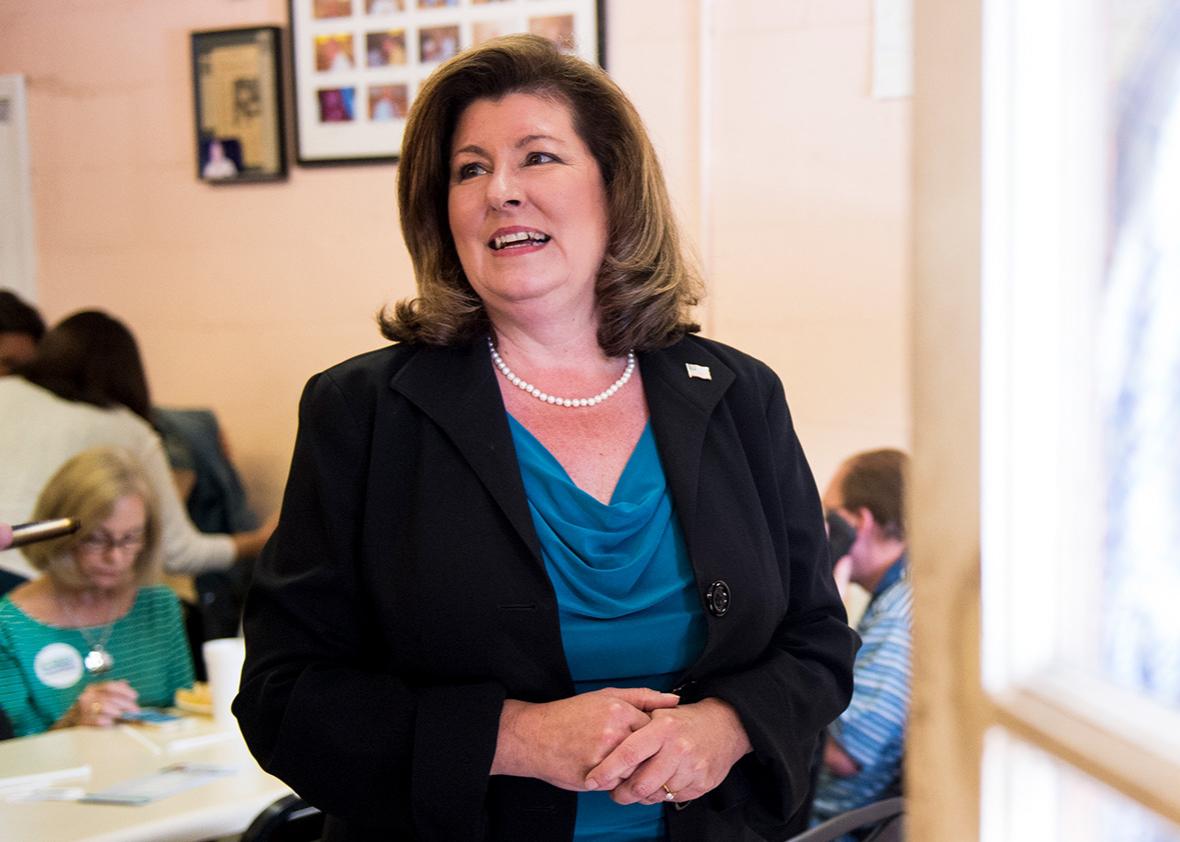Democrat Jon Ossoff narrowly missed an outright win in the special election for Georgia’s 6th Congressional District on Tuesday. Ossoff walked away with national name recognition and a tantalizing 48 percent of the vote. But because he didn’t make it to 50 percent in the crowded “jungle primary,” he will face his nearest rival in a runoff in June.
That rival, Republican Karen Handel, bested 10 Republican contenders to pull in 20 percent of the vote on Tuesday. Handel is a former Georgia secretary of state and the chairwoman of the Fulton county Board of Commissioners. But nationally, she was best known before this week for her role in an embarrassing episode that exemplified the insanity of the contemporary abortion wars. In 2012, the Susan G. Komen Foundation announced it would pull grant money from Planned Parenthood, then hastily reversed its decision, annoying just about everyone in its constituency over the course of just a few days. Handel was the organization’s Senior Vice President of Public Policy, and the Huffington Post reported at the time that she was the “prime instigator” behind the decision to cut Planned Parenthood’s funding and try to make it look nonpolitical. Handel left the breast cancer charity days after it reversed its decision.
Handel doesn’t seem to want to spend much time talking about Planned Parenthood these days. In an interview with Fortune this week, her spokeswoman cut off the conversation when reporter Alana Abramson asked about it. Handel called back, but wouldn’t say whether she supports Republican efforts to defund the organization. But Handel’s rhetoric on Planned Parenthood hasn’t always been so restrained. In 2012, she wrote a book about the affair titled Planned Bullyhood: The Truth Behind the Headlines About the Planned Parenthood Funding Battle with Susan G. Komen for the Cure. It is a revealing read for anyone interested in Handel’s approach to leadership, politics, and reproductive healthcare.
In the introduction, Handel describes the episode as “the story of how one of the least controversial organizations in America … became a target of the left simply for trying to do the right thing for its mission.” The broad outlines of her narrative are not implausible: Komen had been contemplating ending its financial support for Planned Parenthood for almost a decade, she writes, in part because they were drawing increasing heat from abortion opponents. The money Komen gave Planned Parenthood was negligible to both organizations, which sat down together in 2011 and agreed on messaging to make the disentanglement go smoothly.
Needless to say, it did not go smoothly. And this is where Handel’s account becomes less steady. Ending the relationship wasn’t Handel’s passion project, she writes; the assignment simply landed on her desk. (The New York Times was among those who reported that those severing conversations escalated after Handel arrived at Komen.) She blames the whole thing on Planned Parenthood for breaking the “gentle-ladies agreement” about not going to the press, as if the media and feminist activists would not have otherwise cared. She writes that even Karl Rove advised Komen to cave and reverse course. (When the book came out, Rove denied this.) She slams “the almighty left,” “the fury of the liberals,” the “tyrannical leftist infrastructure,” and the “feminist left.” Handel calls Planned Parenthood and its supporters “hysterical,” “Obama’s consigliere,” and “one of the left’s most ruthless enforcers.” At one point, she seems to compare Komen to a victim of domestic abuse, and Planned Parenthood to “an irate ex-partner who would stop at nothing to keep us together.”
A chapter on Nancy Brinker, the founder of Komen, is worth highlighting for its masterful smarm. “Some saw Nancy as self-serving,” but Handel prefers to think of her as “politically astute.” Oh, and “some viewed Nancy as a bit self-absorbed.” Not Handel, of course, who knows Brinker was just “singularly focused.” Handel heard a silly rumor Brinker wanted to be known as the “Duchess of Boobs,” but she can’t imagine Brinker actually saying so.
Planned Bullyhood belongs to a mini-genre of exposes and tell-alls that capitalize on the right’s particular hatred for Planned Parenthood. There’s the 2011 memoir Unplanned: The Dramatic True Story of a Former Planned Parenthood Leader’s Eye-Opening Journey Across the Life Line, by Abby Johnson, the former director of a clinic in Texas who has made a career out of her defection. Activist David Daleiden, currently facing felony charges over his undercover videos of Planned Parenthood employees, has done a masterful job of portraying the organization as a secretive, villainous wing of the “abortion industry.” For many who oppose legal abortion, it’s not enough to simply observe that Planned Parenthood is an abortion provider: It must also be a secretive, duplicitous law-breaker and, in Handel’s words, a “deeply cynical exploiter of political conflict.”
But if Planned Bullyhood makes anything clear, it’s that the left does not have a monopoly on cynical exploitation of the abortion debate.
